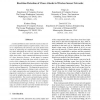Free Online Productivity Tools
i2Speak
i2Symbol
i2OCR
iTex2Img
iWeb2Print
iWeb2Shot
i2Type
iPdf2Split
iPdf2Merge
i2Bopomofo
i2Arabic
i2Style
i2Image
i2PDF
iLatex2Rtf
Sci2ools
119
Voted
ICDCS
2008
IEEE
2008
IEEE
Real-Time Detection of Clone Attacks in Wireless Sensor Networks
A central problem in sensor network security is that sensors are susceptible to physical capture attacks. Once a sensor is compromised, the adversary can easily launch clone attacks by replicating the compromised node, distributing the clones throughout the network, and starting a variety of insider attacks. Previous works against clone attacks suffer from either a high communication/storage overhead or a poor detection accuracy. In this paper, we propose a novel scheme for detecting clone attacks in sensor networks, which computes for each sensor a social fingerprint by extracting the neighborhood characteristics, and verifies the legitimacy of the originator for each message by checking the enclosed fingerprint. The fingerprint generation is based on the superimposed s-disjunct code, which incurs a very light communication and computation overhead. The fingerprint verification is conducted at both the base station and the neighboring sensors, which ensures a high detection pro...
Related Content
| Added | 30 May 2010 |
| Updated | 30 May 2010 |
| Type | Conference |
| Year | 2008 |
| Where | ICDCS |
| Authors | Kai Xing, Fang Liu, Xiuzhen Cheng, David Hung-Chang Du |
Comments (0)

